|

Frawley Named Columbian College Dean | Washington Welcomes A Herd of Its Own | Building a New Business School | Home, Sweet Home | GW and Ellipse Host Simmons at 2002 Commencement | 75 Years of CBS | Faculty Focus: A Street Smart City Slicker | GW Baseball: A Big Hit | “…Such Stuff As Dreams Are Made On…” | Tele-Course Brings Major Political Figures to GW | At a Glance | GW in History

Frawley Named Columbian College Dean
 William Frawley, formerly faculty director for academic programs and planning at the University of Delaware, joined GW July 1, 2002, as dean of the Columbian College of Arts and Sciences. William Frawley, formerly faculty director for academic programs and planning at the University of Delaware, joined GW July 1, 2002, as dean of the Columbian College of Arts and Sciences.
“I would like Columbian College of Arts and Sciences to be a driving force in promoting an education that has rigor and consequence, making the GW experience visible because of its substance, depth, and effectuality,” Frawley said.
Frawley plans to establish more opportunities for undergraduates to become assimilated into the academic and professional world by integrating the promotion of core competencies such as writing, problem solving, and decision making into the curriculum. He also plans to bolster the undergraduate experience with learning communities and freshman seminars. In short, he anticipates a positive change in the undergraduate and graduate academic experience.
President Stephen Joel Trachtenberg noted Frawley’s strong and diverse academic background with enthusiasm: “His keen interest in the position, linked with his well- balanced experience as a faculty member and academic administrator, bring to us the spectrum of experience that I seek in a new dean,” Trachtenberg said. “I expect that Dr. Frawley will be a strong leader, as well as a solid manager, for the academic well being of the Columbian College.”
As faculty director for academic programs and planning at the University of Delaware, Frawley—a linguistics professor—amended the core requirements of its College of Arts and Sciences. He also established 36 living-learning communities for students who demonstrate academic success and involvement in the university.
He has previously served as chair of the Delaware linguistics department and director of the Delaware cognitive science program. He expressed his enthusiasm for his new position, saying, “I am very excited and honored to work at one of the premier institutions in the world. GW has top faculty and students, and very smart and progressive leadership.”
Jean Folkerts, who served during the search period for a year as interim dean of Columbian College, this summer resumed her role as director of the School of Media and Public Affairs.
Frawley’s current research projects include service as editor-in-chief of the second edition of the Oxford International Encyclopedia of Linguistics. Frawley also has co-edited a book on dictionaries of the American Indian languages.
Frawley earned a BA in English from Rowan University, formerly Glassboro State College. He holds an MA in linguistics from Louisiana State University and a PhD in linguistics from Northwestern University. He has been nominated three times for the Excellence in Teaching Awards and once for Excellence in Undergraduate Advising.
—Lindsay Crawford
Back to top | Fall 2002 Table of Contents

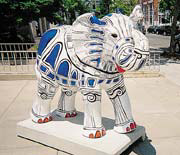
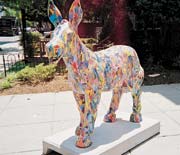
Just down the street from the GW Hippo, who to date has offered no comment about the interlopers.
|
Washington Welcomes A Herd of Its Own
Thanks to the D.C. Commission on the Arts and Humanities, the phrase “party animals” has taken on a totally new meaning in Washington and, specifically, on the GW campus. Neither GW’s elephant, “Capital Parade,” nor its donkey, “Donkey of a Different Color,” litters, carouses, or indulges in strong drink. Our 4-by-5-foot sculptures just hang out, so to speak, in front of the GW Professors Gate on 21st Street. And they are rarely alone. Children of all ages stop to tweak their ears and pat their heads.
Besides GW’s party animals, some 198 other symbols of Washington’s main industry dot the city landscape. Artists participating in the project—about half of whom hail from the D.C. area—received the bare, fiberglass sculptures, and many of the artists painted together in a mass studio in Washington. The phenomenon follows the lead of other cities like New York, Chicago, and Baltimore that in recent years have had sculptured animals (cows, pigs, fish, you-name-it) stampeding in their streets.
This fall the party animals will be auctioned off to benefit the Arts Commission’s grants and education programs. “GW continues to be a supporter of the arts and is thrilled to be a ‘Party Animals’ sponsor,” President Trachtenberg says. “Our hippo may have to share the spotlight, but we don’t think he’ll mind!” —Sandy Holland
|

Building a New Business School
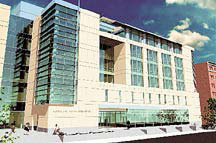
This computerized rendering shows how the new business school building, Duques Hall, will look upon completed construction in late 2004 or early 2005.
|
Henry “Ric” Duques and his wife, Dawn, have pledged a gift of $5 million toward the establishment of “Ric and Dawn Duques Hall,” a new, 167,000-square-foot building to house GW’s School of Business and Public Management. Both are GW alumni.
GW will break ground on the new business school complex this fall, with an expected occupancy date set for late 2004 or early 2005. The building will join Funger Hall on the 700 block of 22nd Street.
In addition to high-tech classrooms, team rooms, a career center, and computer labs, Duques Hall will feature a Capital Markets Room, where students can utilize financial information systems, access real-time quotes, and learn skills for financial modeling, trading, and portfolio management. The building also will house an executive conference center.

Henry “Ric” Duques, BBA ’65, MBA ’69
|
Ric Duques, who is chairman of First Data Corp., earned two GW degrees—a BBA in accountancy in 1965 and an MBA in accountancy and finance in 1969. He noted his warm appreciation for the University that provided him with an education on a basketball scholarship, thus enabling him to become the first in his family to graduate from a four-year university. “It seems very appropriate to Dawn and me that we share some of our success with GW,” Duques said. “Many of us who have achieved a measure of financial success tend to ‘forget’ the people or institutions that gave us the skills and support along the way.”
Margaret Shepard, director of development at the School of Business and Public Management, characterized the donation as a “catalytic gift,” she said. “There has never been a more pleasurable moment than to be able to accept a gift that means so much to the alumnus and alumna in giving.”
Dawn Duques earned her BA at GW’s School of Education and Human Development in 1968. The couple has sent their two children through GW. Their son, David, earned a BBA in 1997, and their daughter, Tiffany, earned a BBA in 2002.
Duques is a member of GW’s Board of Trustees and received the GW Distinguished Alumni Achievement Award in 1993.
In recognition of the Duques’ academic legacy at GW, President Stephen Joel Trachtenberg noted, “The Duques family is a big fan of the University. And we are big fans of all of them.” Trachtenberg also praised the family’s generous gift in taking “the School of Business and Public Management to the next level.”
The School of Business and Public Management’s primary building is the Hall of Government, into which it moved in 1938. The school now also occupies Monroe Hall, as well as four other buildings on campus. The new complex will house the entire school in one location.
First Data Corp. has previously been recognized for its generous gifts to GW. The firm named a tiered lecture room in memory of the late Benjamin Burdetsky, a professor and dean of the school who served on First Data’s Board of Directors from 1992 to 2000.

Home, Sweet Home
 Donkeys and elephants may “roam” the streets of the District of Columbia, but a home here is nonetheless a treasure to be prized. Soon, thanks to a historic new four-way partnership among Riggs Bank, Fannie Mae, the District of Columbia Housing Finance Agency, and GW, home ownership in D.C. could become a reality for many GW employees. Donkeys and elephants may “roam” the streets of the District of Columbia, but a home here is nonetheless a treasure to be prized. Soon, thanks to a historic new four-way partnership among Riggs Bank, Fannie Mae, the District of Columbia Housing Finance Agency, and GW, home ownership in D.C. could become a reality for many GW employees.
This summer, the University launched the GW Home Program, a collaborative effort to encourage eligible GW faculty and staff to apply for down payment and closing cost assistance toward the purchase of a primary residence in D.C.
“We established the GW Home Program to help faculty and staff looking to buy their first home in the District of Columbia make their dream a reality,” says President Trachtenberg.
The program, administered through GW’s Department of Human Resources Services, also assists prospective D.C. residents through its Education Resource Center, which provides home-buying seminars, workshops and housing resource materials.
Full-time faculty or staff members who have been working at GW for at least two years may apply for the benefits of the new program. The employee must be interested in having a primary residence in the city and must be a first-time home purchaser in D.C.
The Education Resource Center also helps employees look for homes in the District. The office will be staffed by a representative of Riggs Bank, who will meet with prospective homebuyers to provide mortgage counseling and information about different home financing options.
For more information, visit the GW Home Program’s Web site at www.gwu.edu/~gwhome or call (202) 994-5369.

GW and Ellipse Host Simmons at 2002 Commencement
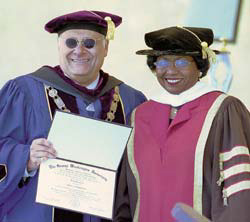
President Trachtenberg presents Brown University President Ruth Simmons with the honorary Doctor of Humanities degree.
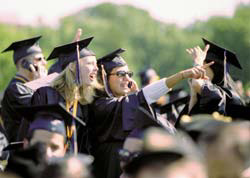
May 19 GW graduates celebrate the end of their school years and the beginning of their futures.
|
Brown University President Ruth J. Simmons, a prominent scholar who is the great-great granddaughter of slaves and the first African American to become president of an Ivy League institution, delivered the keynote address at GW’s 2002 Commencement. She also received the honorary degree of Doctor of Humanities. More than 20,000 people gathered at the May 19 ceremony on Washington’s Ellipse to recognize some 4,200 graduates of the Class of 2002.
Along with Simmons, recipients of honorary degrees included Darrell Green, the Washington Redskin’s All-Pro defensive back and two-time Super Bowl champion, who received the doctor of public service degree, as did Jim Hall, former chairman of the National Transportation Safety Board; Lois Green Schwoerer, author, scholar, and Elmer Louis Kayser Professor Emeritus of History at GW, received the doctor of letters degree; and John Zeglis, the chairman and chief executive officer of AT&T Wireless Services and former chair of the GW Board of Trustees, was presented with the doctor of laws degree.
Simmons has been recognized as a leader in improving campus race relations and opening higher education opportunities for minorities and disadvantaged groups. In 1995 she became the first African American to head a top-ranked American college or university when she was named president of Smith College, and she was unanimously elected Brown University’s 18th president in 2001. No stranger to GW, she taught French at the University during the 1968-69 academic year while she was enrolled here for graduate work.
In recognition of influential GW professors and her time spent in Washington, Simmons’ commencement address took note of her “special debt to GW for launching me onto a path that led me to the role I now play.
“I had a novel experience here that shaped my thinking about how to contribute to society,” Simmons said in her address. “Of course, many of you, whether sitting in the audience while ‘Crossfire’ was broadcast live from the campus, or seeing your teachers quoted in public policy debates about trade reforms or tax cuts, or whether combining your classes with internships at the White House, the World Bank, or on the Hill, you’ve gotten the kind of education available to few in the world.”
Finally, Simmons exhorted the graduates “to understand and assert with exuberance the joy and purpose of living and the possibilities of using this excellent education to the best advantage. Go into your communities and fight for the things we will need to secure our humanity…” Simmons urged.
Also during Commencement, GW honored six members of the community with the GW Award. Those receiving awards included Edward A. Caress, executive associate dean of the Columbian College of Arts and Sciences and professor of chemistry; Jason Cohen, graduate student and general manager, WRGW; Joel W. Cook, associate dean of the undergraduate program at the School of Business and Public Management and associate professor of strategic management and public policy; Diane DePalma, director of the University Counseling Center; Truyen Pham, senior informations system engineer of the Information Systems and Services Division; and Roger Kapoor, graduating senior and president of the Student Association.
The GW Award recognizes individuals at the University who have made outstanding contributions to and whose achievements have resounded throughout the community.
In recognition of superior contributions, three faculty members were awarded the Oscar and Shoshana Trachtenberg Prizes. Recipients included Arun Malik, associate professor of economics, who received the prize in teaching; Cornelius Bennhold, associate professor of physics, who received the prize in research scholarship; and William Parke, professor of physics, who received the prize in university service.
Six members of GW’s alumni family were awarded the Distinguished Alumni Achievement Award. Recipients included Ruth Cooper Burg, BS ’45, JD ’50; Kenneth P. Moritsugu, SMHS ’71; William A. Owens, MBA ’76; Elliott C. Roberts Sr., MBA ’64; Ya-Qin Zhang, DSc ’89; and James W. Ziglar, BA ’68, JD ’72.
The May 19 Commencement included all GW schools and colleges except the Law School, which held its ceremonies May 26 in the Charles E. Smith Center. There, former U.S. Senate Majority Leader George J. Mitchell delivered the keynote address.

75 Years of CBS
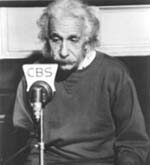 From Sept. 3 through Oct. 18 GW’s Luther W. Brady Art Gallery will be presenting an exhibit commemorating the 75th anniversary of broadcasting giant CBS. From Sept. 3 through Oct. 18 GW’s Luther W. Brady Art Gallery will be presenting an exhibit commemorating the 75th anniversary of broadcasting giant CBS.
“America Through the CBS Eye, An Exhibition Organized by the CBS Photo Archive,” located within the gallery as well in exhibit cases on the first and second levels of the Media and Public Affairs Building, in which the gallery is housed, features more than 100 photographs. Many of them, like this Albert Einstein photo, depict famous entertainers and newmakers and date back to 1927 when CBS began broadcasting. The gallery also will host a reception on Sept. 18, the actual CBS anniversary date.
In addition to the exhibit, GW Vice President for Communications Michael Freedman, former general manager of CBS Radio Network News, is conducting two special interviews with CBS luminaries. Freedman will host, “A Conversation With Walter Cronkite: ‘The Most Trusted Man in America’” Sept. 22 at 2 p.m. in Lisner Auditorium, in which Cornkite will reflect on his distinguished broadcast career. On Oct. 10, Freedman will interview Richard C. Hottelet in, “The Murrow Boys and Journalist Richard C. Hottelet, The Golden Age of CBS Radio News,” at GW’s Media and Public Affairs Building at 6 p.m. Both interviews are being conducted as part of the Smithsonian Resident Associate Program.
“This is a happy convergence for GW, CBS and The Smithsonian Associates,” said Freedman. “Through this unique partnership we will provide GW students and the greater Washington, D.C., community with a dramatic view of broadcast history and a rare opportunity to hear from two legends of the profession, Walter Cronkite and Richard C. Hottelet. As with CNN “Crossfire,” this exhibit will also cast a global spotlight on GW’s new Media and Public Affairs offerings.”
For more information about the exhibit, contact the gallery at (202) 994-1525. Gallery regular hours are Tuesday through Friday, 10 a.m. to 5 p.m.
A limited number of free tickets are available to the GW community for the Smithsonian events. For more information, contact GW’s Office of University Events, (202) 994-7129, e-mail use@gwu.edu.

Faculty Focus: A Street Smart City Slicker
A Series of Personal Glimpses of GW Faculty Members
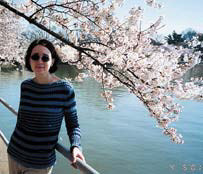 Six years ago, Ricia Chansky arrived in the nation’s capital with her husband and belongings. The fast-paced hubbub of Washington was daunting to a couple that had just come from a small town in Massachusetts. “It was a tough city to break into,” Chansky remembers. “When we arrived, it was really just my husband and me. It took time before we felt like Washingtonians.” Six years ago, Ricia Chansky arrived in the nation’s capital with her husband and belongings. The fast-paced hubbub of Washington was daunting to a couple that had just come from a small town in Massachusetts. “It was a tough city to break into,” Chansky remembers. “When we arrived, it was really just my husband and me. It took time before we felt like Washingtonians.”
These days, Chansky, a GW lecturer in English and a freshman adviser, doles out advice and inside tips to wide-eyed newcomers to a city that once seemed so foreign to her. Chansky, who serves as a writing consultant for D.C.’s renowned art venues like the Smithsonian Institution and the Kennedy Center, was recently featured as the cultural life and arts expert for the Newcomer’s Handbook for Moving to Washington, D.C., Third Edition (First Books, 2002). She has also served as a contributing writer for “DC Pages,” a popular online resource for information about Washington.
As a contributing writer to the D.C. edition of the Newcomer’s Handbook, Chansky toured the city to give readers suggestions for weekend excursions and information about community-based art and literary nooks. Chansky provides visitor information and short descriptions of theaters, museums, historic sites, and nightclubs. “There are wonderful cultural organizations, and, for the most part, they’re free. Things like that are really special.”
The Newcomer’s Handbook is a series of guides designed to help individuals acclimate to the metropolitan, fast-paced tempo of many of the United States’ largest cities. Each edition features contact information for many entertainment and educational opportunities in the cities and surrounding suburbs.
Chanksy believes that the Newcomer’s Handbook is an important account of city life and proves useful in helping potential residents decide if the city life is right for them. The handbook reminded Chansky of her own transition to the District and how long it took until she was fully confident in her Washingtonian status. “I began to think, ‘I really could have used this myself!’”
An important part of being a resident in the District is being aware of all of resources, events, and opportunities the city offers. However, making the nation’s capital feel like home can be difficult. “There is so much in D.C.!” exclaims Chansky. “It really brings in people from all around the country for jobs, but considering it your home is a hard transition.”
Referring to GW students fondly as “my kids,” Chansky says that her freshman counseling helps give her a sense of what it’s like to be new to the city all over again. “I’ve been a part of Colonial Inauguration [orientation] and it feels so good to see this group of very young, very concerned people coming to me. I’m honestly one of the first people they meet when they come to GW. It feels great to offer reassurance and advice.”
Washington is a bustling city with an international population and a seemingly endless list of resources for Washington residents of all ages. Getting newcomers familiar with all that the city has to offer and making people feel at home is always a thrill to Chanksy. “There are things on absolutely any topic you are interested in,” she says.
Part of the fun of researching D.C. is learning the inside stories behind different places that you wouldn’t find in a brief guide to the city. The story of a ghost that haunts the seats at the National Theatre and of a cat that lives at the Kennedy Center are among Chansky’s favorite tales.
Chansky confesses that the best part of her job is getting assignments for things that she would normally pursue outside of her career. Visiting different institutions, landmarks, and sharing fascinating facts about “America’s Hometown” with the rest of the community are part of her daily life. “It’s a lot of fun to have a job that sends you out to do things you enjoy.”
—LC

GW Baseball: A Big Hit
"If you’re not going to be here, you better win.”
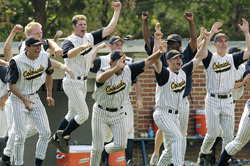
The Colonials celebrate their A-10 win over Richmond.
photos by Scott K. Brown
|
Those were Kirsten Walter’s words from her hospital bed shortly after giving birth while her husband, Tom, was with his GW baseball team at the Atlantic 10 Conference regular season awards banquet. Walter tried to get back to Washington that day in May but was turned away at the Hartford airport because the doors to the last flight were shut.
So he took his wife’s declaration to heart, and he and his Colonials went out and won. They beat Dayton and St. Bonaventure to qualify for the championship round of the A-10 Tournament against national powerhouse Richmond. With a surprise visit from Kirsten, their son, Chase, and newborn daughter, Casey, they watched Walter and the Colonials win two out of three games over the Spiders. Those victories propelled GW to the NCAA Tournament for the first time in 10 years and for only the seventh time in school history.
The 2002 baseball team reflects the hard work of the last six seasons of coaching by Walter and his staff. “I am excited and proud of our players,” Walter says. “When we recruited the seniors, GW hadn’t won very much up until then. It’s easy for players to go to the top 10 schools that have always won, but to go somewhere and turn that program into a winning one is something special.”
This year’s squad set the school record for most wins for the fourth time in five years. The team also set new single season records for runs, hits, doubles, home runs, runs batted in, and total bases. Walter, who broke the 36-year-old record of 193 career wins by a GW coach, chalks up this success to more than just his baseball acumen.
“You don’t set the school record for wins four out of five years and win a conference championship without having talented personnel,” Walter says. “I’m no great coach. I just play the hand I’ve been dealt, and it’s a pretty good hand.”
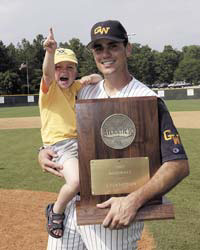
Coach Tom Walter with son Chase.
|
His right hands this year include three assistant coaches—Dennis Healy, Jeff Waggoner, and Mark Coleman—who Walter calls the backbone of the program. He’s also been dealt great players like third baseman Matt Krimmel, outfielder Tony Brown, and pitchers Jason Baker and Mike O’Connor.
And then there’s Mike Bassett, the most prolific power hitter in GW history. Bassett put the team on his back against Richmond and helped carry it to the conference championship by hitting three home runs in as many games. He finished the season batting .382, with 19 home runs and 77 RBIs. He holds seven GW records.
GW’s baseball tradition reaches back for decades. Many of these former coaches and players have called Walter to offer their congratulations, and the coach appreciates the alumni support. He also knows how this year’s success can help in the future.
“Winning the conference championship and winning 42 baseball games gives us another sell to recruits,” Walter says. “Come here and you’re going to experience some of these same things.”
—Greg Licamele

“…Such Stuff As Dreams Are Made On…”
 Few of us ever achieve it, but Shakespearean scholar Gail Kern Paster has been living what must seem to be a dream come true since July 1, when she took office as director of the Folger Shakespeare Library. The Folger, home to the world’s largest Shakespeare collection, also hosts a theater, poetry readings, and a period musical group. Few of us ever achieve it, but Shakespearean scholar Gail Kern Paster has been living what must seem to be a dream come true since July 1, when she took office as director of the Folger Shakespeare Library. The Folger, home to the world’s largest Shakespeare collection, also hosts a theater, poetry readings, and a period musical group.
Much of Paster’s work outside of GW has been focused at the Folger for three decades. A longtime GW professor of English, Paster also is editor of the scholarly journal Shakespeare Quarterly. A trustee of the Shakespeare Association of America, she recently was elected vice president and will become president in 2003. She has won many national fellowships and awards, including fellowships from the Woodrow Wilson Foundation, National Endowment for the Humanities, and the John Simon Guggenheim Memorial Foundation.
Paster succeeded Werner Gundersheimer, who spent 18 years at the Folger’s helm. Of his successor, he says, “I can’t imagine anyone better qualified to take the Folger to the next level. Gail has the energy, intellect, vision, and style to make a great institution even stronger.”
Paster, who holds a BA from Smith College and earned her PhD from Yale University, commented on the Folger: “Scholars from all over the world and from many different academic disciplines come to the Folger to do research impossible in any other single institution. … No other institution that I know of does a better job of conserving the objects in its keeping or communicating the relation of past and present in an exciting, varied, and accessible way. It is an honor to be asked to lead the Folger and continue the work of its crucial educational mission.”
The author of numerous scholarly articles and two books, Paster is currently working on a new book under the auspices of a Mellon Foundation/Folger Fellowship. This book, like much of her work of the past 30 years, is being written in the Folger’s Reading Room.
—SH
GW Magazine featured Paster in its fall 1996 issue.

Tele-Course Brings Major Political Figures to GW
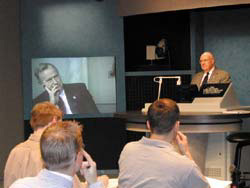
Professor East hosts George H.W. Bush as part of the tele-course.
Paul Caffrey
|
Former President George Bush and prominent members of his foreign policy-making team interacted live with students from GW and Texas A&M universities as part of a joint long distance learning course taught by Maurice A. East, GW professor of international affairs and political science, and Texas A&M professor Charles F. Hermann.
The tele-course, entitled “Problems in Contemporary U.S. Foreign Policy: Insights from the First Bush Administration,” brought key political figures of the post Cold War era onto both campuses simultaneously through live videoconference via closed circuit TV. GW participants in the weekly class, held in spring 2001 and 2002, consisted of both undergraduate and graduate students from the Elliott School of International Affairs, the University Honors Program, and the Department of Political Science.
The brainchild of East, former dean of the Elliott School, and longtime friend Hermann, the first director of the Bush School of Government and Public Service at Texas A&M University, the innovative course fully utilized the strategic locations of both participating universities.
Foreign policy expert Hermann, whose Bush School is located next door to the Bush Library and Museum, has direct access to the former president, as well as to the library’s impressive collection of archival material about the Bush years. GW’s location in the heart of Washington—where many of the president’s former foreign policy leaders live—was perfect for attracting an impressive slate of guests.
“We were intrigued by the possibility of using technology to capitalize on both President Bush’s access and appeal and GW’s location,” says East. “The president had appeared twice before student groups at the newly created Bush School and was a tremendous hit,” says East. “When approached about the course, President Bush was very supportive of the idea and agreed to participate and to allow us to contact others in his administration on his behalf.”
The foreign policy makers were “extremely cooperative and generous with their time,” says East. In addition to Bush, 11 guests appeared as featured presenters this past spring, including former head of the CIA Robert Gates, former Secretary of State Lawrence Eagleburger, former U.S. Ambassador to Russia Robert Strauss, and former National Security Adviser Brent Scowcroft.
Students at both sites had ample opportunities to interact with the guests during a 30- to 45-minute question and answer period at the end of each two-and-a-half hour session. “President Bush, who spoke to the class twice, was incredibly personal and warm with the students,” says East. “He had enough of an interest that he called students by name in class and responded to things that they’d said earlier. He was really open, and made an extra special effort to answer the questions, not to dodge them.”
In addition to the prominent speakers, the course was enhanced by weekly audio-visual presentations that set the context for the various cases discussed in class, such as the Malta Summit and China-U.S. relations after Tiananmen Square. “We were able to utilize specialized resources from the Bush Library, such as video clips from key meetings and events involving the president, original documents and drafts, maps, and mementos,” says East.
The undertaking was exhilarating and rewarding. “It was the hardest, most labor-intensive course of my 40-year teaching career,” he says, “but it was also the most exciting educating experience I’ve ever had, without a doubt.”
—Jamie L. Freedman

At a Glance
Board Elects Two Members
On May 17 the GW Board of Trustees added two new members: Nelson Carbonell Jr. BS ’85, co-founder of Cysive, an e-commerce company; and Scott Mory, BA ’96, JD ’99, an associate with Cahill, Gordon, and Reindel. Both were elected to three-year terms.
Dancy Is Shapiro Fellow
This fall GW welcomed four-time Emmy award winning news correspondent John Dancy as the School of Media and Public Affairs’ J.B. and Maurice C. Shapiro Fellow. He will offer a semester-long seminar entitled “Foreign Correspondents and Foreign Policy. Dancy’s honored 30-year career includes both foreign and domestic stints for NBC News.
PEN/Faulkner at MVC
The esteemed PEN/Faulkner Writing Program has a new home, beginning this fall, at GW’s Mount Vernon Campus. Among past winners of PEN/Faulkner Awards are such luminaries as E. L. Doctorow, Don Delillo, E. Annie Proulx, and Philip Roth.
Nothing But the Best
Jimmy D’Andrea, a D.C. teaching fellow in the Graduate School of Education and Human Development, received the D.C. “First Class Teacher Award,” naming him the best first-year high school teacher in Washington. D’Andrea commented, “I strive to create a wide range of daily activities in my classroom in order to generate a natural spark of engagement when students come to my class and then try to capitalize on that spark each day to help students focus on learning.” The D.C. Office of Teacher Affairs sponsors the award.
Stepping Up D.C. Care
GW’s new, 371-bed, $100 million-dollar-plus hospital celebrated its grand opening in August. The magazine will bring you more news of this innovative structure—located just across 23rd Street from the old hospital—in a future issue.
Partners in Flight
GW and the Federal Aviation Administration have launched a partnership under the FAA’s Collegiate Training Initiative, whereby the FAA will recruit GW undergraduate and graduate students for internship opportunities. These internships enable students to pursue careers in engineering, computer science, and geography/ cartology. GW will, in turn, provide cohort courses for FAA employees and open enrollment courses for individual FAA employees.
All Academic
Roger Kapoor, BA ’02, last year’s GW student government president, was named to USA Today’s All Academic Third Team. Kapoor was recognized for his excellence in academics and his leadership on campus.
The Rankings Derby
U.S. News & World Report listed GW’s Law School, Graduate School of Education and Human Development, and graduate programs in health and public affairs in its latest “America’s Best Graduate Schools” issue. The Law School tied for 25th; and the international law program ranked sixth in the country, while environmental law is ranked ninth. The Graduate School of Education and Human Development was ranked 35th in the country and 11th among private institutions. Among GW’s health programs, its physician assistant program is ranked second in the nation, rehabilitation counseling is ranked seventh, and speech-language pathology is ranked 30th.
Dancing Back to GW
Highly regarded Washington dancer/choreographer/artistic director Dana Tai Soon Burgess, MFA ’94, returns to his alma mater this fall as assistant professor of dance in the Department of Theatre and Dance. He has previously served as an adjunct professor at GW.
Prize Economist
David C. Ribar, GW associate professor of economics, won the “Kuznets Prize” for his article, “The Socioeconomic Consequences of Young Woman’s Childbearing: Reconciling Disparate Evidence,” in the Journal of Population Economics. The journal awards the Kuznets Prize for the best paper published during a three-year period.
Applause for the Boss
GW President Stephen Joel Trachtenberg, received two outstanding honors this spring. He was elected as a fellow in the nation’s preeminent learned society, the American Academy of Arts and Sciences. He also was the keynote speaker for the University of New Haven’s spring commencement, at which he received an honorary doctor of laws degree from that university. Trachtenberg joins an impressive AAAS Class of 2002 that includes Sen. Edward Kennedy, Violinist Itzhak Perlman, three Nobel Prize winners, three MacArthur fellows, six Guggenheim fellows, and four college presidents. He was elected to the Academy by its current members because of the unique part he has played in developing GW into a major national research University as well as his role in integrating the urban campus into the fabric of the community and the local government.

GW in History
25 Years Ago
We highlight GW’s academic rankings in various disciplines above. Not mentioned is its ranking in the following area, which apparently got the attention of Hatchet editors, who published this on Feb. 17, 1977: “The February Genesis magazine, a monthly publication roughly on a par with Penthouse and Hustler, ranks GW 20th on its annual list of ‘America’s Twenty Sexiest Colleges.’ ”
50 Years Ago
By 1952, GW already was building its international student base. In March of that year, the Hatchet reported, “Out of 9,200 aspiring scholars cramming for exams on this campus, 280 of them are students representing 65 countries.” The largest international student populations hailed from China (22 students), followed by Germany (17), England (13), Canada (13), Greece (12), and the Philippines (12).
100 Years Ago
There is this letter, from the June 18, 1902, minutes of the Board of Trustees: “The Library is in great need of attention. University work cannot be done properly without a good library for the use of students and officers. To put the library in proper shape, we should have ten thousand dollars to be spent at once, and this should be followed by not less than five hundred dollars a year. …”
The magazine gratefully acknowledges the assistance of University Archives in the identification of interesting historical information. Readers wanting to learn more about GW’s history can find the University Archives Web site by accessing www.gwu.edu/~archives. The site’s Historical Almanac is especially informative.

|